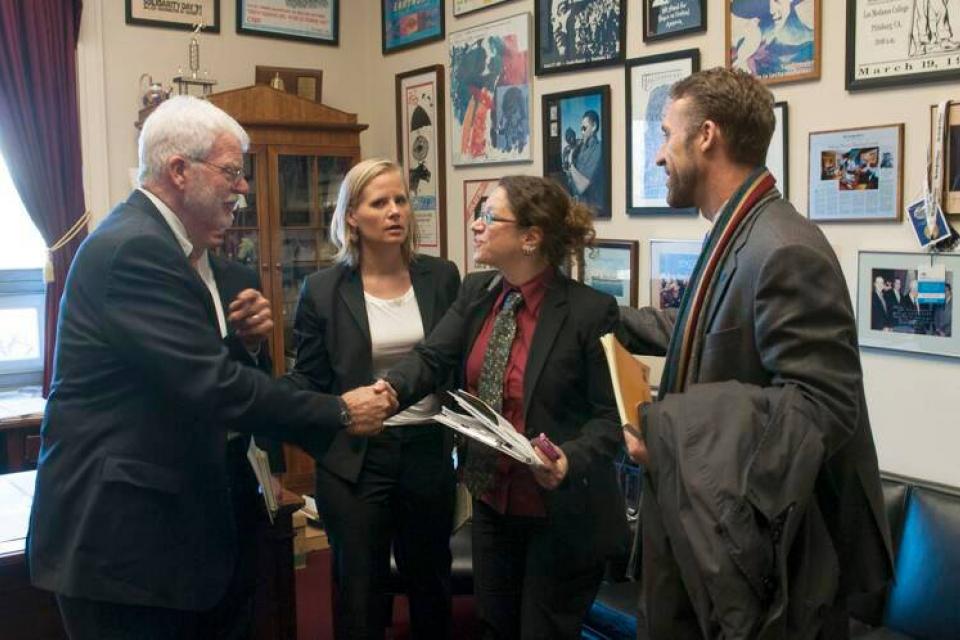Newsroom
Early educators fight reckless closure of community Head Start
Congresswoman Maxine Waters questions motives of L.A. County Office of Education
Watts was still smoldering from the riots in 1965 when Kedren Head Start began serving local families. Today, about 350 Kedren employees care for more than 2,100 children at 32 sites from South Los Angeles and Koreatown to the Eastside.
“All of us work in low-income, dangerous areas,” said Margaret Garcia, a family service advocate at one of Kedren’s multiple Watts facilities. An undercurrent of violence runs through the neighborhoods.
Judge rules trial required to determine legality of ACCJC actions
CFT lawsuit advances significant step toward fair accreditation in community colleges
City College of San Francisco started 2014 with some much-needed good news. San Francisco Superior Court Judge Curtis Karnow ruled that the school’s accreditation cannot be revoked until a trial determines whether the Accrediting Commission for Community and Junior Colleges, or ACCJC, acted unlawfully in sanctioning the college. Karnow said in his ruling that closing the college would be “catastrophic.”
CalSTRS Board Member: Perspective on the shortfall
CalSTRS reports that its unfunded liability grows by $22 million every day that nothing is done. While most California public pension funds can raise annual employer rates when they need more money, CalSTRS requires legislation to raise rates.
The importance of adult education and including adult educators in consultation
Testimony of CFT's Jeff Freitas before Senate Education and Assembly Higher Education Committees
Thank you Senator Liu, Assemblymember Williams, and the committee members.
My name is Jeff Freitas and I am the Secretary Treasurer of the California Federation of Teachers. The CFT represents early childhood educators, K-12 teachers, classified employees, community college faculty, UC lecturers and librarians, and adult educators in the K-12 and community college worlds.
Judge issues injunction to keep CCSF open
CFT President Joshua Pechthalt (left) talks with media outside San Francisco Superior Court on December 26. In the courtroom that day, Judge Curtis Karnow listened to arguments for a preliminary injunction to keep City College of San Francisco open.
The judge issued the injunction on January 3.
CFT leaders testify at Washington D.C. Capitol hearing
ACCJC given a year to come into compliance
December 13, 2013—CFT Secretary Treasurer Jeff Freitas (right) and AFT 2121 President Alisa Messer (shaking hands with Congressman George Miller) met with Miller while in Washington D.C. to attend the hearing at which the Accrediting Commission for Community and Junior Colleges (ACCJC) was given a year to come into compliance with 15 standards it has violated.
Pilot colleges resist implementing two-tier fees in new law
FiFive of six districts not following program mandated in AB 955
In October, Gov. Jerry Brown signed the controversial Assembly Bill 955, which allows six colleges to charge students out-of-state rates for high-demand classes, such as English and algebra, during the winter and summer sessions. This means about $200 a unit, as compared to the current $46.
Fair accreditation: Congresswomen lead forum in support of City College
Fair accreditation, transparency demanded of out-of-control agency
Cañada College alumnus and Congresswoman Anna Eshoo called community colleges lifeboats and springboards for Californians. Congresswoman Jackie Speier said they keep our workforce vibrant. And state Sen. Jim Beall said seven of his nine siblings went to community colleges, the only way they could afford higher education.
Annual conference salutes four classified heroes
From Pasadena to San Francisco, staff make a difference every day
Nothing better illustrates the theme of this fall’s Classified
Conference, “Celebrating Our Role in Quality Education,” than the
staff who go above and beyond the call of duty.
The honorees were nominated by their unions and selected as
Members of the Year because they are positive role models for
workers and students, contribute to the success of the local, and
are committed advocates of high-quality education.
Adult Education: New regional consortia meld state programs
Grassroots action required to meet community needs
By Cynthia Eagleton
Ever Since Wall street crashed into Main Street five years ago, adult education has been in a state of change. Until five years ago, adult education in California was stable: Classes were provided primarily through K-12 districts as a protected categorical, and in a few cities, as non-credit offerings at community colleges.
Historic funding change includes district accountability plans
The new Local Control Funding Formula brings significant opportunities for educators and their unions
Under the LCFF, the governing boards of districts, county offices of education and charter schools, known as Local Education Agencies, are required to adopt a Local Control Accountability Plan every three years starting in July 2014.
Don’t sign! State initiative attacks public employee pensions
San Jose Mayor Chuck Reed is mounting a major attack on educators’ pensions. He has filed a voter initiative with the Secretary of State and may start collecting signatures in early 2014 to qualify it for the November ballot.



